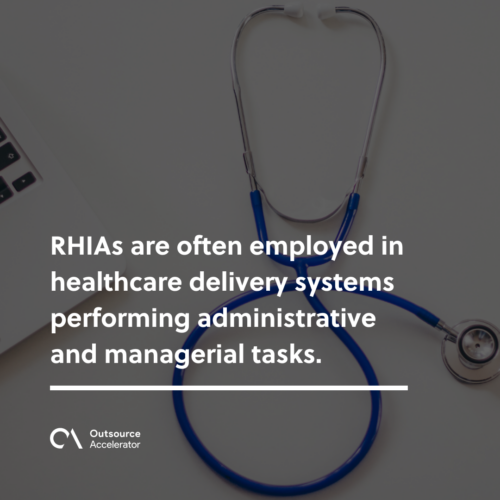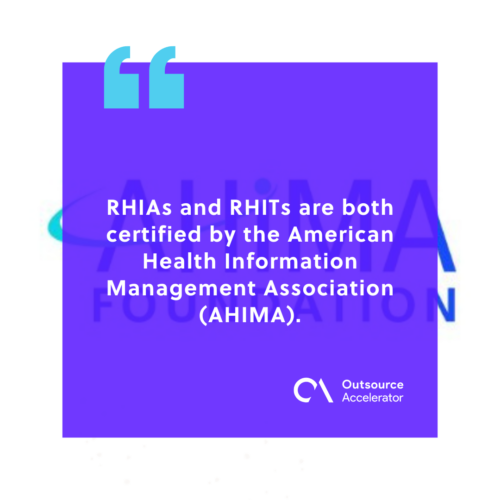Registered health information administrator: What you need to know

The COVID-19 pandemic has thrust the healthcare industry and its allied sectors into the limelight.
However, putting the health sector into the public’s consciousness isn’t the only thing the pandemic did.
Almost overnight, it has forced the majority of the world’s businesses to turn digital in a sink-or-swim bid to remain operational.
These two factors – the healthcare sector going mainstream and businesses going digital – paved the way for recognizing the importance of one particular healthcare role: the registered health information administrator (RHIA).
These health workers answer the need for more efficient health information systems highlighted by the sector’s digitization and digitalization. [1]
What is a registered health information administrator?
A registered health information administrator is a health professional with knowledge that leans more on the logistical aspect of healthcare, such as:
- Medical
- Ethical
- Administrative
- Legal standards
- Information technology (IT)
They are experts at collecting and analyzing health and patient data and using these to make administrative decisions.
As such, RHIAs are often employed in healthcare delivery systems performing administrative and managerial tasks.
Recently, organizations from other sectors not directly involved with patient care have also begun hiring RHIAs.
These include insurance carriers, government agencies, managed care services, software vendors, pharmaceutical companies, and even educational institutions.

Duties of a registered health information administrator
Typically, an RHIA oversees medical data management systems in hospitals and other healthcare facilities. [2]
This duty includes supervising registered health information technicians (RHIT). RHITs are healthcare professionals with similar backgrounds but fewer managerial responsibilities and more IT tasks.
Managing and implementing data capture systems and processes for various types of health information are also part of an RHIA’s responsibilities.
RHIAs are also expected to contribute to process-efficiency improvement and compliance with existing state and federal regulations.
RHIA vs. RHIT
RHIAs and RHITs are both certified by the American Health Information Management Association (AHIMA). AHIMA is a non-profit organization representing professionals in the health information management sector.
Both roles are also concerned with keeping accurate records and creating efficient health information systems
However, registered health information administrators are more qualified to take on supervisory roles than their technician counterparts.
Often, RHITs have to pursue further education to attain the same level of qualification RHIAs have.
RHITs specialize in coding medical information and procedures for reimbursements or research. These technicians may further specialize and become cancer registrars – healthcare personnel compiling and updating cancer patient records.
Where do registered health information administrators work?
As healthcare professionals, RHIAs work in hospitals and other ambulatory care settings.
However, the nature of their job makes them practical additions to even non-medical businesses, such as insurance and IT vendor companies.
As mentioned earlier, educational institutions sometimes include RHIAs in their payrolls, as well.

Outsourcing registered health information administrators
The increasing need for more RHIAs amid the present pandemic has kept a steady demand for these professionals.
As providers of staffing solutions, BPO firms answered these demands and supplied businesses with skilled RHIAs.
Eclaro, a BPO company known for providing top-tier expertise in the healthcare industry, is one of the best options for hiring RHIAs offshore. They specialize in providing professional support for healthcare institutions in the US that augment with in-house teams for better efficiency.
Aside from the pandemic-induced demand, there are many other compelling reasons why businesses outsource registered health information administrators instead of hiring in-house.
Here are a few examples.
Reduced labor and overhead costs
Outsourcing lets businesses save on salary costs by hiring health information management professionals from offshore firms in developing countries.
This move saves businesses as much as 70% on salary costs due to the disparity in the costs of living between countries.
Moreover, outsourcing firms also shoulder end-to-end recruitment, training and equipment costs, including other overhead expenses of outsourced RHIAs.
Access to better technology
Outsourcing firms are often better technologically equipped than most companies, as technological superiority is among their selling points.
Through outsourcing, businesses gain access to the leading-edge industry technologies that offshoring firms often have. Analyzing patient data and electronic health records will be massively simplified.
These techs can include hardware, software (custom-made and proprietary), and entire IT infrastructures.
As these technologies are expensive – often requiring purchase, maintenance, and subscription – businesses are also saved from additional expenses by outsourcing.
Improved efficiency
Enhancing process efficiency and output quality is another benefit gained from outsourcing.
With well-equipped and highly-trained health information management professionals, it’s a given that the quality of work they will deliver is top-notch.
Many outsourcing companies employ RHIAs that have been in the industry long enough to know which methods and practices work best.
These outsourced RHIAs improve the overall efficiency of the business operations they handle.
Assured regulation compliance
Strict compliance with existing regulations is a non-negotiable with businesses, particularly those in healthcare or related industries.
Fortunately, outsourcing firms know the importance of complying with state and federal regulations to avoid potential complications.
Thus, these service providers ensure utmost compliance with existing regulations, such as the Health and Insurance Portability and Accountability Act (HIPAA)
Moreover, these firms also make sure to improve the standards of their systems and receive ISO certification. Your internal team may even benefit from information management education conducted by these outsourcing companies.
References:
[1] the sector’s digitization and digitalization. Perrin, P.B. Pierce, B.S. Elliott, T.R. “COVID-19 and telemedicine: A revolution in healthcare delivery is at hand,” Health Science Reports, 2020 Jun, 3(2): e166, doi: 10.1002/hsr2.166
[2] data management systems in hospitals and other healthcare facilities. Sharma, D.K., Chakravarthi, D.S., Shaikh, A.A., Ahmed, A.A.A., Jaiswal, S. and Naved, M., 2021. “The aspect of vast data management problem in healthcare sector and implementation of cloud computing technique,” Materials Today: Proceedings. doi.org/10.1016/j.matpr.2021.07.388







 Independent
Independent




